|
|
|
Sort Order |
|
|
|
Items / Page
|
|
|
|
|
|
|
| Srl | Item |
| 1 |
ID:
154184
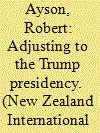

|
|
|
| 2 |
ID:
097164
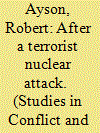

|
|
|
|
|
| Publication |
2010.
|
| Summary/Abstract |
It is just possible that a terrorist nuclear attack could catalyze an inter-state nuclear war. The likelihood of a terrorist group gaining access to nuclear weapons is lower than some fear, and terrorists might not use a nuclear weapon as soon as they had acquired one. But if a terrorist group was to explode a nuclear device in a country that was itself armed with nuclear weapons, and especially if that country was in a conflict-prone relationship with another nuclear-armed state, the broader consequences of even a single terrorist nuclear detonation could be much more serious than some assume.
|
|
|
|
|
|
|
|
|
|
|
|
|
|
|
|
| 3 |
ID:
077240
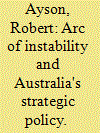

|
|
|
|
|
| Publication |
2007.
|
| Summary/Abstract |
The proposition that Australia faces an 'arc of instability' to its north has been an important feature of the Australian strategic debate in the early twenty-first century. Prompted by worries in the late 1990s over Indonesia's future and East Timor's uncertain path to independence, the 'arc' metaphor also encapsulated growing Australian concerns about the political cohesiveness of Melanesian polities, including Papua New Guinea and Solomon Islands. While tending to overlook the divergent experiences of countries within its expanding boundaries, the 'arc' fed from Australia's historical requirement for a secure archipelagic screen. As such it has became an important weapon in the debate over whether the locus of Australia's strategic priorities should be increasingly global in the 'war on terror' period or remain closer to home in the immediate region. The 'arc of instability' metaphor was consequently adopted by leading Australian Labor Party politicians to argue that the Howard Coalition government was neglecting South Pacific security challenges. It became less prominent following the Howard government's greater activism in the South Pacific, signalled by Australia's leadership of the East Timor intervention in 2003. But its prominence returned in 2006 with the unrest in both Honiara and Dili. In overall terms, the 'arc of instability' discussion has helped direct Australian strategic and political attention to the immediate neighbourhood. But it has not provided specific policy guidance on what should be done to address the instabilities it includes.
|
|
|
|
|
|
|
|
|
|
|
|
|
|
|
|
| 4 |
ID:
119065
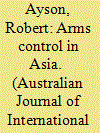

|
|
|
|
|
| Publication |
2013.
|
| Summary/Abstract |
Even if the international mood in favour of steep US and Russian nuclear cuts was to last, it is unlikely to spread to Asia, where nuclear arsenals remain comparatively modest and where regional allies rely on Washington for extended deterrence. This does not render nuclear arms control irrelevant in Asia, where there is a modest but significant tradition based on informal and unilateral restraint rather than formal agreement. But as more of Asia's nuclear programs have come out of the closet and as great power relationships intensify, the region needs to look nuclear arms control more squarely in the eye. For arms control to have real purchase in tomorrow's Asia, China and the USA will need to look beyond their currently asymmetrical relationship and find an understanding based on increased nuclear transparency which also restrains their potentially escalatory competition in advanced conventional war-fighting abilities.
|
|
|
|
|
|
|
|
|
|
|
|
|
|
|
|
| 5 |
ID:
151610
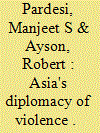

|
|
|
|
|
| Summary/Abstract |
Military coercion has already changed the Asia-Pacific region.
|
|
|
|
|
|
|
|
|
|
|
|
|
|
|
|
| 6 |
ID:
134019
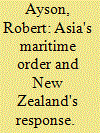

|
|
|
|
|
| Publication |
2014.
|
| Summary/Abstract |
Robert Ayson comments on the South China Sea. Asia's regional security and New Zealand foreign policy
as the powers jostle in a more competitive Asia-Pacific region, it may seem counter-intuitive to call for a clearer New Zealand position on the South China Sea disputes. But even as regional tensions grow, Wellington can stick up for its principles without joining a chorus of China criticism. Under the key government, New Zealand's alignment with the United States is becoming more pronounced through a series of small but cumulatively important steps. this makes it even more important for New Zealand's policy to be staked out clearly, including in written from accessible to the public discussion.
|
|
|
|
|
|
|
|
|
|
|
|
|
|
|
|
| 7 |
ID:
052971
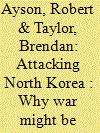

|
|
|
|
|
| Publication |
Jul-Sep 2004.
|
|
|
|
|
|
|
|
|
|
|
|
|
|
|
|
| 8 |
ID:
101830
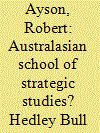

|
|
|
|
|
| Publication |
2011.
|
| Summary/Abstract |
To the extent that there is a distinctively Australasian school of strategic studies it is to be found in the work of Hedley Bull, a scholar who is more widely noted for his work as an international relations theorist. Bull's lesser known but influential contributions to strategic studies dealt with the management of nuclear weapons in international strategic relationships and the management of great power relations in the Asia-Pacific region. His work in these areas, while less well known than some of his other writings, deserves contemporary attention as strategic change in Asia increasingly shapes the international strategic picture, thereby creating the opportunity for Australasian strategic analysts to influence the global debate.
|
|
|
|
|
|
|
|
|
|
|
|
|
|
|
|
| 9 |
ID:
099686
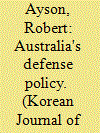

|
|
|
|
|
| Publication |
2010.
|
| Summary/Abstract |
Australian defense policy suggests a case where strategic ambitions exceed the country's direct security needs. But there are some peculiar reasons for this state of affairs. These include the relationship between the size of the Australian continent and its proximity to maritime Asia; Australia's sense of itself as a medium power with a strong interest in the future of the wider regional strategic balance; and the long-standing judgment that Australia needs a capacity for independent military action in its own area because even its closest allies cannot always be expected to help out. The Rudd government's 2009 Defence White Paper, the first such document in nearly a decade, confirms this pattern of thinking. In particular it reflects Australia's interest in not falling behind the defense modernization in the wider region of strong and rising powers (including, but by no means limited to, China). It helps return a sense of coherence to Australian policy which went missing in the post-9/11 era. But the new White Paper risks pushing that familiar logic too far. The Australian Defence Force envisaged for 2030 includes a larger flotilla of new-generation submarines, 100 Joint Strike Fighters alongside other capable combat aircraft, air warfare destroyers and new frigates. Many of these platforms, the White Paper suggests, could be armed with cruise missiles. This leaves no doubt that the writers of this review are serious about maritime operations in the Asian century. But one is left wondering whether the Rudd government and its successors can and will deliver on the whole package, and whether a more optimistic assessment of the region's strategic future could allow for a defense force which is closer to what has gone before.
|
|
|
|
|
|
|
|
|
|
|
|
|
|
|
|
| 10 |
ID:
138613
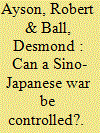

|
|
|
|
|
| Summary/Abstract |
It has been decades since the last war between major powers in Asia, but there is no guarantee that the region will always be able to avoid conflict. The greatest strain on the peace is in North Asia, where there has been rising tension between China and Japan. What begins as a
minor skirmish between China and Japan could conceivably escalate into a more serious conflict that involved the United States and, in the worst case, the use of nuclear weapons by Beijing and Washington. Even a major conventional conflict (between just Japan and China, or
involving all three) could be devastating for North Asia and the wider region, leading to a significant loss of life and widespread political, institutional and economic damage.
|
|
|
|
|
|
|
|
|
|
|
|
|
|
|
|
| 11 |
ID:
089146
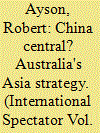

|
|
|
|
|
| Publication |
2009.
|
| Summary/Abstract |
From Australia's perspective, and in spite of the global economic crisis, an increasingly strong China will remain the dominant theme in Asia's evolving distribution of power. Australia has benefited from the prosperity which is the foundation of China's rise. But it continues to value the reassurance that a strong United States can bring to Asia. This favourable status quo seems superior to the alternatives: a cooperative Asian community which may be more aspirational than practicable; an Asian concert which requires an unlikely sharing of leadership between the great powers; or a coalition of Asian democracies which could be especially divisive. But as this comfortable status quo is strained, Australia may need to consider geopolitical options which until now have appeared fanciful and risky.
|
|
|
|
|
|
|
|
|
|
|
|
|
|
|
|
| 12 |
ID:
105489
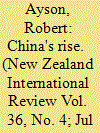

|
|
|
| 13 |
ID:
117733
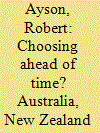

|
|
|
|
|
| Publication |
2012.
|
| Summary/Abstract |
Australia's profile as one of Washington's leading allies in the Asia Pacific has grown due to the Obama Administration's rebalancing strategy. While New Zealand is both unable and unwilling to match the intensity of its neighbour's relationship with the world's leading power, its own strategic ties with Washington have strengthened considerably in recent times. While Australia's alliance with the United States may raise future challenges vis-Ã -vis its increasingly important relationship with a rising China, New Zealand also has a balancing act to maintain, not least because of its close economic ties with the People's Republic. In different ways both Australia and New Zealand may currently be reducing their room for maneouver if and when the contest between the United States and China becomes more severe. The risks may be higher for Australia because the same strategic geography that gives it renewed prominence may also increase its exposure to competition and conflict in Asia, and because its own military rebalancing towards the north and west of the continent is occurring just as its defence budget has been significantly cut. For New Zealand, while those direct risks may be smaller, staying on Canberra's radar screen will become harder. Indeed as they each look towards their own relationships with the major powers, Australia and New Zealand may need to work even harder to sustain their own bilateral alliance relationship.
|
|
|
|
|
|
|
|
|
|
|
|
|
|
|
|
| 14 |
ID:
137243
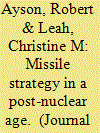

|
|
|
|
|
| Summary/Abstract |
While the arrival of nuclear weapons coincided roughly with the development of short, medium, intermediate, and eventually intercontinental missiles, the contribution of missile technology to the deterrence equation is often lost. If nuclear weapons were eliminated, even new generation missiles with conventional payloads could struggle to render effective deterrence. But some of the physical and psychological effects commonly ascribed to nuclear weapons could still be in play. And in a world without nuclear weapons, thinking about the use and control of force from the nuclear age would also deserve renewed attention.
|
|
|
|
|
|
|
|
|
|
|
|
|
|
|
|
| 15 |
ID:
173157
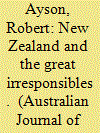

|
|
|
|
|
| Summary/Abstract |
New Zealand's willingness to call out irresponsible great power behaviour is a major test for Jacinda Ardern’s promise that her government will stand up for its values internationally. In fact, New Zealand has been weaker on Russia’s irresponsibility in the Ardern era than it was under the National Party-led governments of John Key and Bill English. The situation is reversed, however, for New Zealand's response to irresponsible international behaviour by China from the South China Sea to cybersecurity and human rights. Ardern’s commitments to international tolerance and cooperation have also made for a stronger response to the divisive turn in US foreign policy under Donald Trump. But there has also greater inconsistency in New Zealand's positioning since Ardern became Prime Minister in late 2017. Among the explanations for these trends is the Labour Party’s agreement to hand the foreign affairs and defence portfolios to the New Zealand First Party, which has amplified the contribution to New Zealand policy pronouncements by the Deputy Prime Minister Winston Peters.
|
|
|
|
|
|
|
|
|
|
|
|
|
|
|
|
| 16 |
ID:
190705
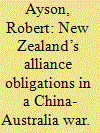

|
|
|
|
|
| Summary/Abstract |
Amidst concerns that Australia may end up in a military confrontation with China, this article evaluates New Zealand’s formal and informal alliance obligations in such an event. In keeping with Wellington’s current declaratory policy, New Zealand’s obligations would be most pressing if the attack occurred on or near Australia, although these would be less clear if China favoured coercion over violence. New Zealand is also likely to have strong alliance obligations if Australian forces were attacked in the South Pacific, the leading area for Australia-New Zealand security cooperation. If Australian forces were attacked in East Asia, New Zealand may have some obligations under the trilateral ANZUS Treaty despite the suspension of Washington’s commitments to Wellington under the same agreement. While New Zealand’s military capacity to assist Australia in maritime East Asia is limited, this is where a serious clash involving Australian and Chinese forces seems most likely. Enlarging the geographical focus of the trans-Tasman alliance may be logical in this new setting, but it could also be hazardous.
|
|
|
|
|
|
|
|
|
|
|
|
|
|
|
|
| 17 |
ID:
064930
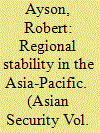

|
|
|
| 18 |
ID:
066709
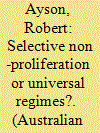

|
|
|
| 19 |
ID:
073566
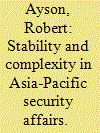

|
|
|
| 20 |
ID:
079809
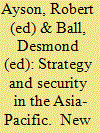

|
|
|
|
|
| Publication |
New Delhi, Viva Books, 2007.
|
| Description |
xx, 343p.
|
| Standard Number |
9781741147988
|
|
|
|
|
|
|
|
|
|
|
|
Copies: C:1/I:0,R:0,Q:0
Circulation
| Accession# | Call# | Current Location | Status | Policy | Location |
| 052926 | 303.625095/AYS 052926 | Main | On Shelf | General | |
|
|
|
|
|
|
|
|
|